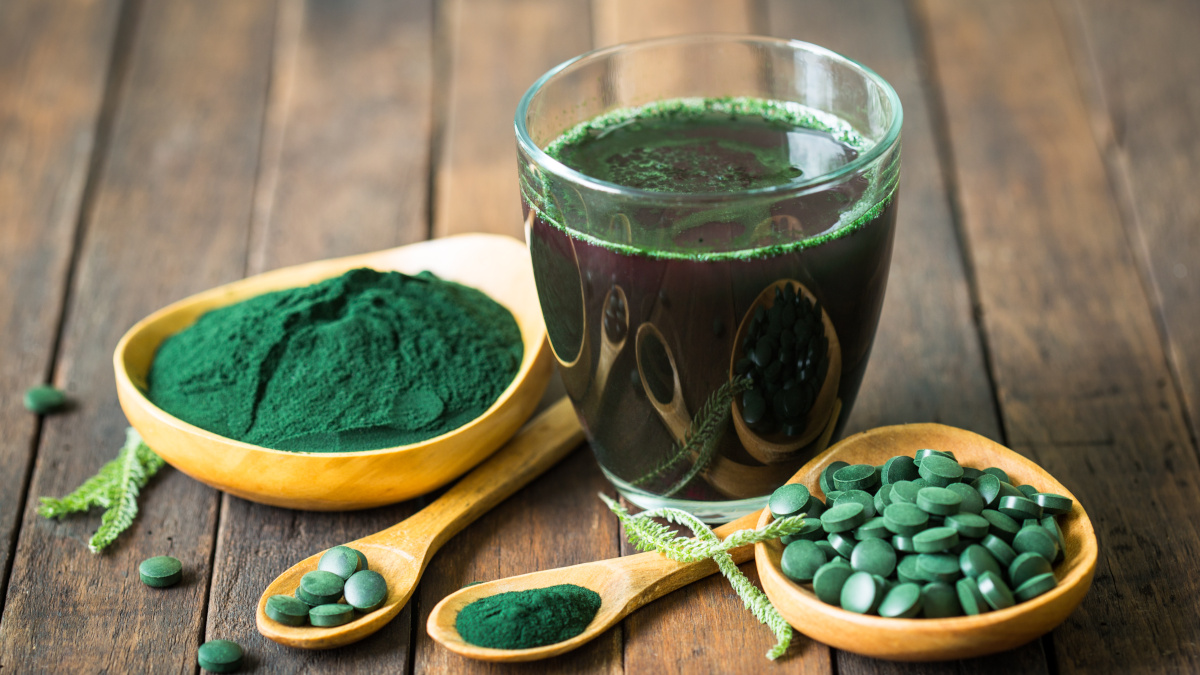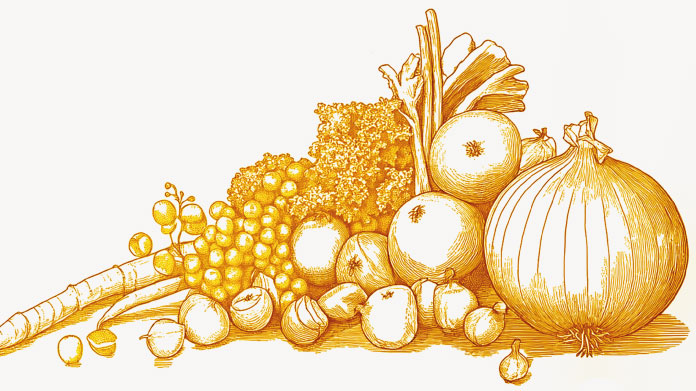Spirulina: when and how should you take it?
Often referred to as a ‘miracle algae’, spirulina is a superfood highly recommended by the WHO. But what exactly is it? What benefits does it offer and how much do you need?

Spirulina: an ancient mixture of cyanobacteria
It was during the conquest of Central America that Europeans discovered spirulina. It was then consumed by the Aztecs, who grew it in Lake Texcoco, close to Mexico, to produce a highly-nutritious mash (1).
Westerners later discovered that a similar kind of algae was grown in Africa, particularly in Chad and the Sahara region, where the locals used it to make pancakes, which, for example, were given to expectant mothers in times of food scarcity to enable their pregnancies to progress well (2).
Spirulina has thus been consumed for thousands of years as a basic food in times of shortage in many parts of the world.
It is considered to be a type of micro-algae or more specifically, a mix of cyanobacteria, in particular Arthrospira platensis, which is easy to cultivate and control.
Today, spirulina’s many nutritional benefits, the most important of which is its very high protein content, have led to the creation of food programs aimed at producing large quantities of spirulina in areas affected by malnutrition, particularly Africa (3-5).
In addition, it is now widely grown for the manufacture of dietary supplements, in the form of powder, flakes or tablets, in China (the world’s largest producer), in the United States, in Africa and even in France by small specialist producers.
Health-friendly micro-algae
The reason so many programs aimed at combatting malnutrition use spirulina to help affected populations is that it contains:
- almost every essential amino acid (6) ;
- a large amount of protein, in the region of 50%-70% of its dry matter (7) ;
- countless nutrients such as vitamins, minerals and essential fatty acids, etc. (8)
However, in order to obtain these nutritional benefits, you need to consume large amounts of spirulina - several hundred grams a day to meet adult daily requirements and provide the necessary nutrients.
Thus in developed countries, it is not consumed for the protein, iron, beta-carotene or essential fatty acids it provides, since a ‘normal’ modern diet, even a vegan or vegetarian one, is far richer in these than is spirulina.
Instead, with interest in spirulina having grown steadily in the West since the 1970s, scientists have been focusing on its health benefits and have discovered that this cyanobacteria:
- promotes energy and vitality (9) ;
- supports weight control by promoting the feeling of satiety (10-11) ;
- and is an immunostimulant (12).
Note: spirulina is often mentioned as a plant source of vitamin B12, and thus a good choice for vegans who do not eat any animal products. However, most recent studies have shown that the vitamin B12 in spirulina may not be bioavailable to humans (13).
When and how should spirulina be consumed?
The majority of studies conducted on supplementation with spirulina have tested doses ranging from 1g to 6g a day. A daily dose of around 4g (that’s 8 tablets containing around 500mg each) would therefore seem to be a good compromise in order to benefit from spirulina’s revitalising and immunostimulant effects (14).
The time the supplement is taken does not seem to affect its efficacy. You can therefore either take your 4g in one go, or spread across the day with several meals.
Choosing a good quality spirulina
In 2017, following several reports of adverse side-effects linked to taking spirulina, an investigation was conducted by an organisation dealing with health and safety called Anses which identified a number of risks associated with taking this blue-green algae. Indeed, like all forms of algae, spirulina grown in poor conditions can become contaminated by heavy metals, cyanotoxins and bacteria.
In addition to noting the risks of allergy which are difficult to assess prior to a first dose of a spirulina-based supplement, Anses primarily recommends that consumers choose a spirulina supplement produced via safe, regulated channels (15). This is precisely the case with Spirulina tablets, which are made by the top spirulina producer ‘Parry Organic Spirulina’, using strictly-controlled aquaculture.
References
- ALI, Shabana Kouser et SALEH, Arabi Mohammed. Spirulina-an overview. International journal of Pharmacy and Pharmaceutical sciences, 2012, vol. 4, no 3, p. 9-15.
- ABDULQADER, Gatugel, BARSANTI, Laura, et TREDICI, Mario R. Harvest of Arthrospira platensis from Lake Kossorom (Chad) and its household usage among the Kanembu. Journal of applied phycology, 2000, vol. 12, no 3, p. 493-498.
- FOX, Ripley D. Spirulina: The Alga That Can End Malnutrition. Futurist, 1985, vol. 19, no 1, p. 30-35.
- MASUDA, Kazuya, INOUE, Yuta, INOUE, Ryo, et al.Spirulina effectiveness study on child malnutrition in Zambia. 2014.
- RR, Siva Kiran, MADHU, G. M., et SATYANARAYANA, S. V. Spirulina in combating protein energy malnutrition (PEM) and protein energy wasting (PEW)-A review. Journal of Nutrition Research, 2015, vol. 3, no 1, p. 62-79.
- CLÉMENT, Genevieve, GIDDEY, C., et MENZI, R. Amino acid composition and nutritive value of the alga Spirulina maxima. Journal of the Science of Food and Agriculture, 1967, vol. 18, no 11, p. 497-501.
- DEVI, M. Anusuya, SUBBULAKSHMI, G., DEVI, K. Madhavi, et al.Studies on the proteins of mass-cultivated, blue-green alga (Spirulina platensis). Journal of agricultural and food chemistry, 1981, vol. 29, no 3, p. 522-525.
- KHAN, Zakir, BHADOURIA, Pratiksha, et BISEN, P. S. Nutritional and therapeutic potential of Spirulina. Current pharmaceutical biotechnology, 2005, vol. 6, no 5, p. 373-379.
- CAPELLI, Bob et CYSEWSKI, Gerald R. Potential health benefits of spirulina microalgae. Nutrafoods, 2010, vol. 9, no 2, p. 19-26.
- DINICOLANTONIO, James J., BHAT, Anusha G., et OKEEFE, James. Effects of spirulina on weight loss and blood lipids: a review. Open heart, 2020, vol. 7, no 1, p. e001003.
- PANCHOLI, Deepika et QURESHI, Ikram. Nutritional Influence (Spirulina) of Biochemical and Obese Stress Patients. Journal of Biological and chemical Chronicles, 2019, vol. 5, no 1, p. 11-13.
- LØBNER, Morten, WALSTED, Anette, LARSEN, Rune, et al.Enhancement of human adaptive immune responses by administration of a high-molecular-weight polysaccharide extract from the cyanobacterium Arthrospira platensis. Journal of Medicinal Food, 2008, vol. 11, no 2, p. 313-322.
- EDELMANN, Minnamari, AALTO, Sanni, CHAMLAGAIN, Bhawani, et al.Riboflavin, niacin, folate and vitamin B12 in commercial microalgae powders. Journal of Food Composition and Analysis, 2019, vol. 82, p. 103226.
- DENG, Ruitang et CHOW, Te‐ Hypolipidemic, antioxidant, and antiinflammatory activities of microalgae Spirulina. Cardiovascular therapeutics, 2010, vol. 28, no 4, p. e33-e45.
- https://www.anses.fr/fr/content/compl%C3%A9ments-alimentaires-%C3%A0-base-de-spiruline-privil%C3%A9gier-les-circuits-d%E2%80%99approvisionnement
Keywords
2 Days
great products and prices
great products and prices
Marie
7 Days
Easy to navigate site
Easy to navigate site, had what I was searching for, good price. easy order-check out
James Tucker
14 Days
My skin is clearing up nicely!
Pretty good for my skin so far.
Christian
16 Days
The new packaging is excellent
The new packaging is excellent - finally! No more squashed boxes and torn envelopes.
GORAN
17 Days
Great Product
Great Product
Larry Garrett
21 Days
Quick shipping
Quick shipping; good price. No issues!
Mary McCarty
22 Days
Thr product is very good and is helping…
Thr product is very good and is helping me on my health. Then is always on time
LUGO Luz
25 Days
Buying was fine
Buying was fine. I had problems with the website not recognizing my login info, and had to call to get it fixed. Other than that, everything was good.
David S. Clark
25 Days
Your super maca and super ginseng are…phenomenal
Your super maca and super ginseng are phenomenal supplements that compliment each other when taking them together. Fantastic feeling of well-being and lots of mid day energy without the crash.
Keith Mason
28 Days
I have had amazing results with every…
I have had amazing results with every supplement I've purchased. I am extremely satisfied with this company
kirstin Torres
28 Days
Fine products
Fine products . They are on the leading edge of online supplements. The only issue -so far-is they sometime run out of subscription items.
Jason Argos
31 Days
The ordering process is very user…
The ordering process is very user friendly and the products always come in a timely manner.
CARTER Rhonda
32 Days
The price for Dr
The price for Dr. Pero's AC-11 is reasonable and in line with his views. (my former colleague). Keep it pure.
CAMPBELL Clayton
34 Days
Right on every time.
Right on every time.
Arthur Nicholas
37 Days
They are cheaper than everyone else and…
They are cheaper than everyone else and the shipping was fast. Great company.
Patricia Adams




